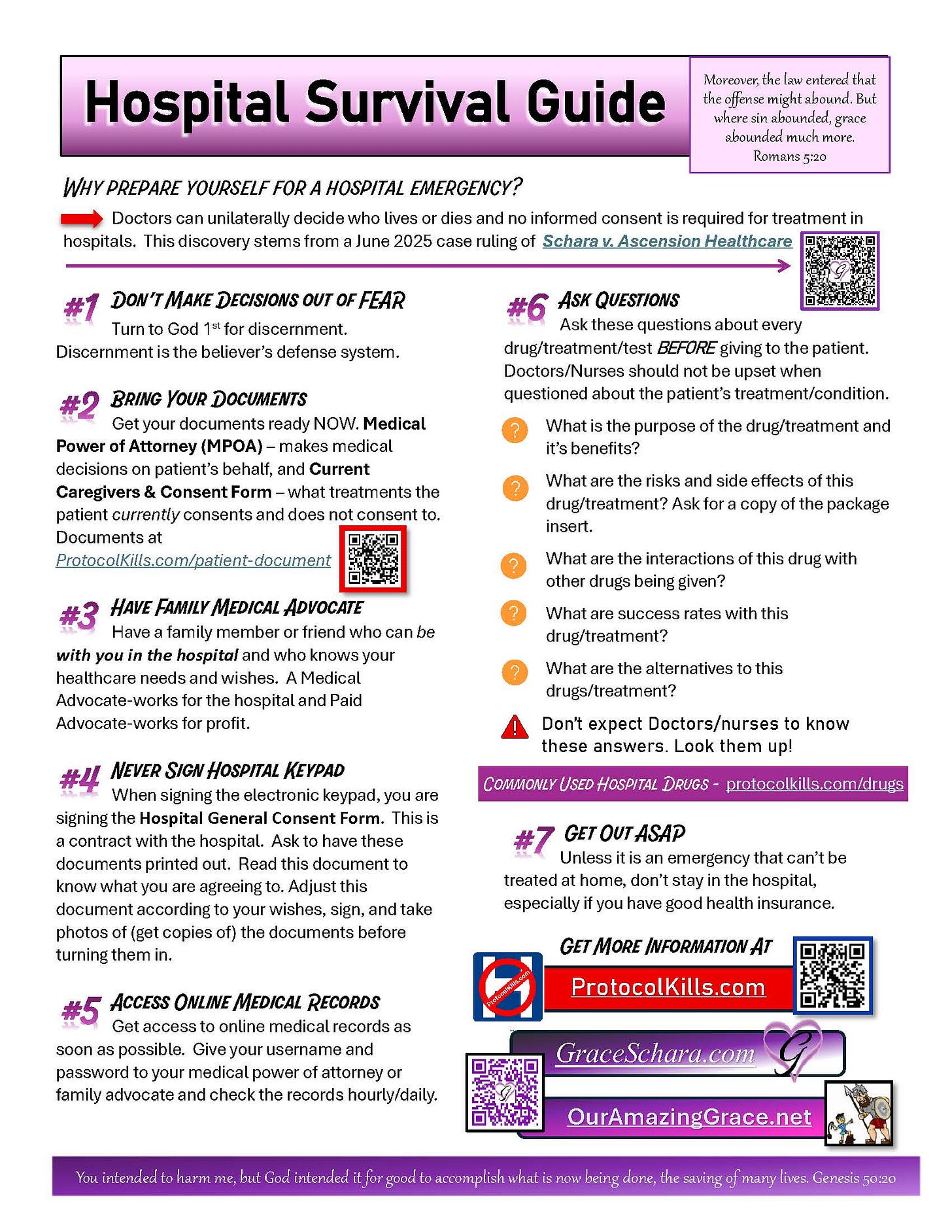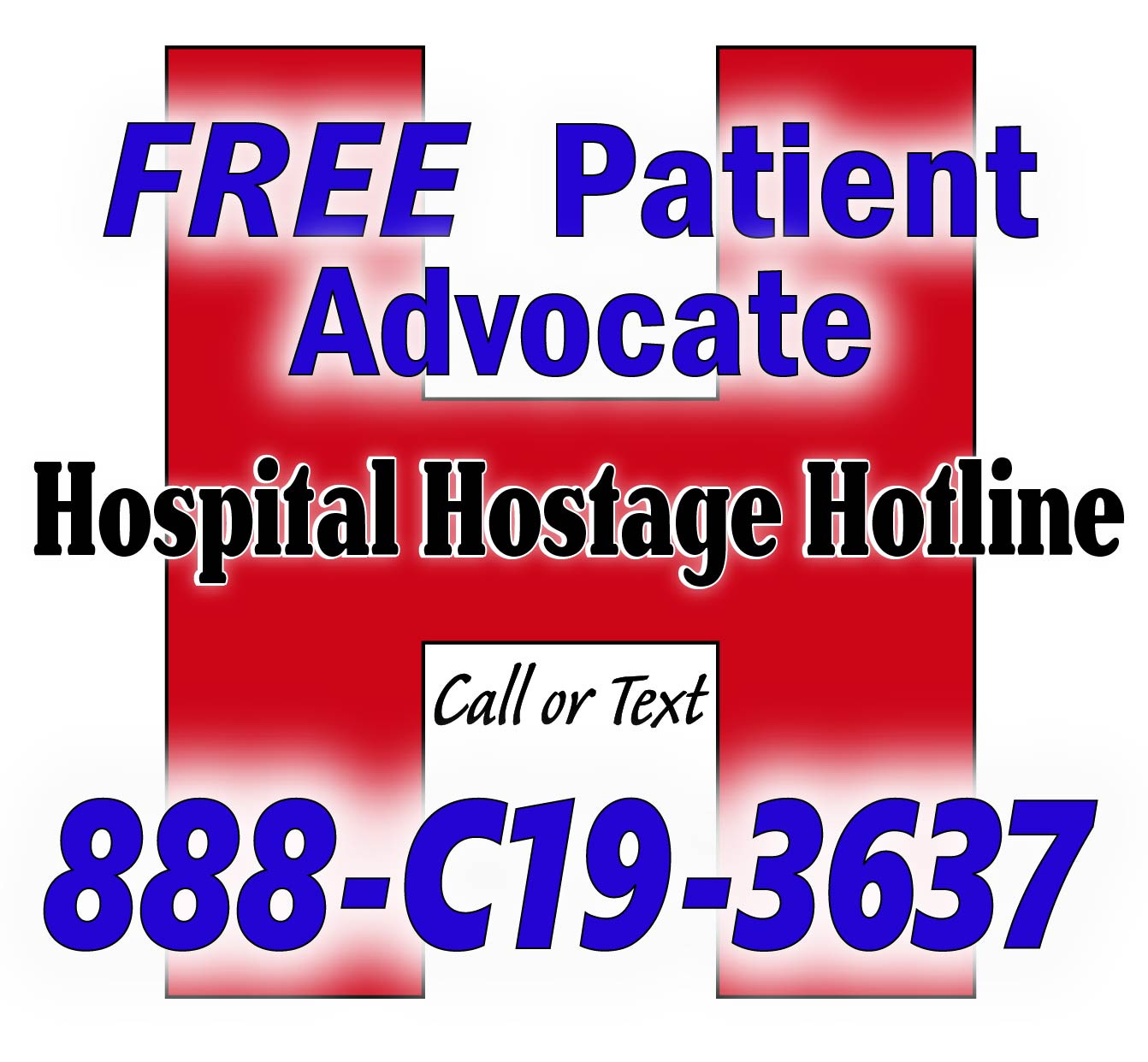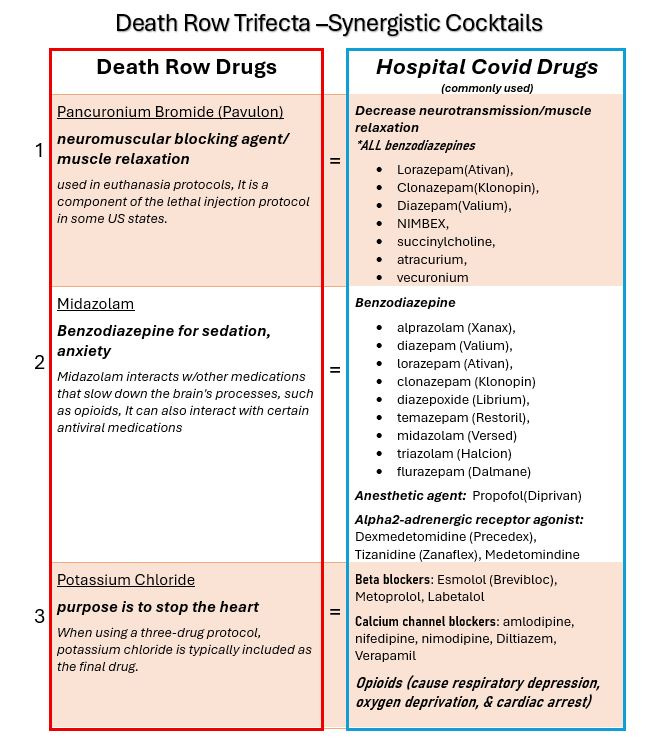After a nearly fatal experience in the hospital with the Covid protocol, sharing victims’ stories, and advocating for hospital patients for the last 4 years, so much has been revealed to me about the current healthcare system. It can be deadly. We are living in times of inversion, and what we thought would help us will kill us if we don’t know how to navigate the landmines in the hospitals.
The recent jury trial of Schara V. Ascension Healthcare revealed exactly what hospitals and doctors are capable of, and the verdict may have emboldened them to continue denying rights to those who are unaware and unassuming of the threats.
This Survival Guide could help save your life from the very institution you go to get healing. I explain the need to have this information on hand in case of an emergency.
Fear Fuels Bad Decisions
Never make a decision out of fear. People cannot think reasonably or logically in a state of panic and fear, and will believe even the most foolish of lies. Like we need to stand in a circle or follow the arrows in a grocery store to keep from spreading an airborne illness. Logic clearly tells us that air doesn't follow a directional path in the grocery store, and it cannot be contained by standing in a circle. The fear of dying is what caused many to go to the hospital for treatment. Fear of losing their career is what kept doctors from leaving hospitals and speaking out against the murders inside those hospitals. Fear of retribution is what keeps doctors from confessing to their crimes. Good decisions in extreme circumstances requires the guidance of God and decrement only He can give us. Turn to God first.
Medical Power of Attorney
A Medical Power of Attorney is someone who makes medical decisions on your behalf when you are unable to. It is important to select a MPOA whom you trust, talk to regularly, understands your wishes and will be willing to follow through with your wishes regardless of what his/her personal beliefs are. A MPOA should be as knowledgeable as possible about the hospital tactics and be willing to ask questions and be attuned to your medical needs as they arise.
Your Advocate (MPOA) will also need to be assertive and willing to stand up to any resistance from anyone who stands in the way of fulfilling his/her duties as my advocate. Many doctors and nurses belittle, talk down to, and even threaten advocates, saying things like: "Do you have a medical degree?", "This is commonly used in hospitals", "I can have you removed for being disruptive." You don't need a degree to inquire about the patient. Each patient is different and has different needs, so what is common may not work for every patient. If a doctor or nurse is calling you combative or disruptive for asking questions, then they are undoubtedly trying to hide something of great importance. Medical Power of Attorney forms can be obtained online for free specific to each state.
Patient Caregiver & Consent Forms
Many people assume these forms are Advanced Directives or a Living Will, THESE ARE NOT. These are NEW, one-of-a-kind documents, created by a hospital insider with a background as an RN, JD(attorney), and 15-plus years of experience in hospital quality assurance and reporting to the hospital CEO or one of the largest hospital systems in America. This document is available from its originating platform: ProtocolKills.com/patient-documents.
This document was created out of a need to uphold patient rights as doctors and hospitals blatantly ignored, manipulated, and abused these rights, leading to the death of thousands of patients. Patients and advocates would refuse drugs or treatments, and doctors would claim they were never told. As in the recent case of Grace Schara, a 19-year-old girl with Down's Syndrome, a DNR (Do Not Resuscitate) was placed on her while the doctor claims he discussed this with her father, and he agreed to it. Basically, if you go into the hospital without written documentation, it is your word against the Doctors.
The hospital also claimed Grace, a 19-year-old girl with Down's Syndrome and the mental capacity of a 12-year-old, gave verbal consent and understood the Hospital General Consent form even though her father was present as her Medical Power of Attorney. As with my experience, I had 66% O2 level, and they claimed I signed the hospital documents & was cognizant to do so. Not only was I not mentally and physically able to agree to legal documentation, but how can one agree to a contract they have never seen, never read, or heard of? In many cases, the hospital documents were forged with the patient's signature. The hospitals have their documents that they will claim you agree to, but you need to go in with your notarized documents to counter their lies.
If you have documents, you should also know how to deliver them. Documents need to be delivered by certified mail or courier service to the hospital CEO because doctors will throw them away or say they didn't get them. Details at ProtocolKills.com/webinar.
These are not Advanced Directives or a Living Will, which both list what the patient wishes are after the patient is incapacitated (unable to make a decision, ex: unconscious, dementia). These are Current Care Consent documents. Have in writing what you consent to before you ever go into the hospital. These documents are based on the Jehovah's Witness right to refuse blood transfusions, and these rights were upheld before, during, and after Covid. I was given multiple medications that nearly killed me, and I never knew because they never told me. They administered all these meds at night. Had these documents been created, I could have gone in with them, and my wishes to be informed of every medication would have been in writing.
In the case with Grace Schara, Doctors claimed that because the drugs used to kill her were commonly used in hospitals, the doctors didn't have an obligation to inform the patients or advocates of their use. The Patient Caregiver and Consent form makes it clear that all medications will be disclosed before administering them to the patient.
Your medical advocate should be in the hospital with you and stay for as long as possible. It should be someone who will respect your medical decisions and wishes and help enforce your rights as a patient. Have someone you know well and trust. Make sure you discuss these things with your advocate before an emergency, don’t just assume they understand or they are informed.
If you find yourself trapped in the hospital and need help you can reach out to Laura Bartlett and her FREE Hospital Hostage Hotline. No one wants to get to that level of need, but sometimes it is unavoidable. Even then, Laura can only guide and inform the decision maker. Ultimately the Medical Power of Attorney of patient will make the decisions.
When you go into the hospital and they tell you to sign the electronic keypad, know that you are signing a contract with the hospital. No one should ever sign a contract without reading it, even if you are told that “It’s just for billing”. Each hospital's General Consent form is different, and they could have included anything from agreeing to a vax, agreeing for the doctor to determine DNR, agreeing to organ donation, and agreeing to being a teaching tool. You could be signing over all your patients' rights and not even know it.
Make sure you ask them to print out this document and read and make adjustments before you sign. If they tell you things like “We can’t print it out.” or “Sure, just sign first.”, don’t accept these responses. By law, you don’t have to sign a document you haven’t read or don't understand. Make sure to have your own documents to reinforce your wishes.
God put me in another situation to learn and share this information. This is an quick explanation of my daughter going to the ER and how I handled it. Link to story.
It’s important to access online medical records as soon as possible. The patient or MPOA will have to request this from the hospital and will have a username and password. This is access to the patient’s medical records so that a family member, advocate, or MPOA can check daily or hourly if needed, to see what drugs have been administered.
Working with the family of a man in the hospital, we urged his wife to get access to the online medical records to see the medications being given. She assured us that the doctor told her that her husband was not getting anything other than Dexamethasone, but 3 days later, after getting access to his online medical records, she discovered he was getting Fentanyl every 30 minutes, as needed. Since he was on a ventilator, the nurses determined, based on visual cues if he was in pain. The wife was so upset because her husband had undergone double knee surgery the year before and never even took Tylenol. The interactions of these two drugs is possibly what caused his death the following day.

Doctors are not truthful, and patients and advocates need to know what they are being given by accessing online medical records. Why would doctors use the most powerful drug in the hospital when the patient is not even able to complain of pain?
Informed consent is more than just a medical provider telling you the name of the drug. I was told, “You’re getting a Covid medication.” I had no idea at the time it was an EUA (Emergency Use Authorization) or that it had killed 53% of the patients in its first trial the year before, and was so deadly it had to be pulled from the trial. I went into the hospital because I could not breathe, and I was coughing up blood clots. I had no idea that they also gave me Baricitinib, a drug that has black box warnings, with the first warning being not to give to patients with clotting issues. Baricitinib will cause Deep Vein Thrombosis (blood clots in the legs) in patients with clotting issues. Three days of being injected with this drug, they knew to do an ultrasound on my leg, and of course, found a blood clot.
Ask questions about every drug
What is the name and spelling
What is the purpose of this drug, and what is its benefit to the patient
What are the side effects and risks of this drug
What are the interactions with other drugs being used
What are the alternatives to this drug
Don’t expect the doctors to know these answers, and don’t expect them to give truthful answers. In some cases, they won’t answer at all. Be prepared to look up all these questions on your own.
All it takes is 3 commonly used hospital drugs to form the same cocktail inmates receive on Death Row for a lethal injection. The only difference is that the inmates get a more humane death, as it is not dragged out over days, so the hospital can collect more money from insurance on the patient. Commonly used hospital drugs
Unless it is an extreme emergency, get out of the hospital ASAP. Even the food served at hospitals is not conducive to healing. Sleep is also an important part of healing, and for me, I was given medications at night, and all my tests were done in the middle of the night. I was able to have my husband visit during the day, but they never discussed with him the medications and tests that were given to me during the night, and of course, I was too tired and sick to talk to him about it. Every aspect of the hospital visit is designed to get the most money out of the patient’s hospital stay while intentionally being elusive with treatments and evading questioning.
If doctors tell me to stay for observation, I can observe at home. If a patient's vitals are good and there is no immediate emergency, it’s better to be safe at home.
















A hospital is a dangerous place for a sick person to be.
I agree full heartedly with Greta; however, I can speak from experience that some of these recommendation are NOT practical . See the following examples:
1. Recently, in an emergency room visit, I wrote allover the hospital admission (and consent to teat) form, and asked for a hard copy 'No PROTOCOL INITIATED ( IM, PO, IV) WITHOUT A PRIOR SIGNED INFORMED CONSENT'. The result was: On my hospital notes, the tattooed nurse wrote "patient refuses treatment" , this is the same tattooed nurse who asked me if I knew what an 'Informed Consent' is . Since this is my nearest hospital that I go to in case of emergencies , now I am faced with the ugly task of discovering how I may legally change my hospital records and ask for disciplinary action against the tattooed hippy for falsified records.!
2. At the same emergency room visit mentioned above, I refused to sign a hospital electronic pad that shows absolutely nothing of what am I signing for , only asking you to trust the clerk who is shoving the electronic machine down your face while shouting with a resounding voice ' NEXT, PLEASE'. I asked for a hard copy and this caused a major racket at the desk, all this was taking place while I was feeling miserable as well as concerned about my health.
The US is the country of 'How many burgers can you flip in one minute', for all I know, this may even be the National Anthem!!!
While I greatly value the very good advices presented here, allowance must be made for the negative reactions and treatment you will receive while you are ill and not in your full mental sharpness.